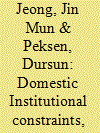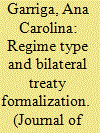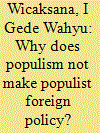| Srl | Item |
| 1 |
ID:
163445


|
|
|
|
|
| Summary/Abstract |
What effect do the domestic institutional constraints in target states have on sanction outcomes? Other than the narrow focus on political regime type, little is known about how the institutional makeup of target states might affect leaders’ ability to adjust their policies to defy sanctions. We assert that the size of veto players in targets is a crucial yet overlooked institutional factor in explaining sanction effectiveness. We contend that political leaders subject to the approval of multiple veto players are more likely to concede as they are less likely to develop polices to counter the sanctions. We assess the empirical merits of our theoretical claims by combining data on sanctions from the Threat and Imposition of Economic Sanctions data set with the veto points data from the Political Constraints data set. Results from the data analysis for the 1946 to 2005 period indicate that the size of veto players is a significant predictor of sanction success even when we control for political regime type and other major political and economic covariates of sanction effectiveness.
|
|
|
|
|
|
|
|
|
|
|
|
|
|
|
|
| 2 |
ID:
091611


|
|
|
|
|
| Publication |
2009.
|
| Summary/Abstract |
How does domestic regime type affect bilateral cooperation, and one of its most visible manifestations, bilateral treaties? This article explains how domestic political regime affects bilateral cooperation and, contrary to the expectations of some scholars, why autocracies should be expected to be more likely than democracies to enter into bilateral treaties. If the preferences of a pair of states are not identical, the sets of agreements that each party would consent to (win-sets) need to overlap for a bilateral treaty to be acceptable. Because additional domestic constraints reduce the size of a country's win-set, autocracies should have broader win-sets than democracies. Therefore, autocratic dyads should be more likely to formalize bilateral treaties than other pairs of states. Based on an original data set, I present empirical evidence showing that pairs of autocracies are more likely than other pairs of states to enter into agreements formalizing bilateral cooperation.
|
|
|
|
|
|
|
|
|
|
|
|
|
|
|
|
| 3 |
ID:
188428


|
|
|
|
|
| Summary/Abstract |
The consequences of populism on foreign policy have been a rising topic of academic inquiry in recent years. The latest literature exposes diverse propensities in the state governments’ international behaviour led by populist leaders. In comparison, foreign policies of populists in the Americas and Europe exhibit anti-elitism and anti-pluralism toward the outside world. Those in Asia tend to be populist domestically, not in foreign policy. This article focuses on the foreign policies of Asian populist government leaders and addresses the question as to why are their foreign policies sterile from populism? It presents the case of Indonesia under President Joko Widodo (Jokowi). The argument is that the enduring pragmatism and domestic constraints have hindered Jokowi's populist motive from shaping the role of the state foreign policy as the defender of the suppressed people against the repressive elite. Hence, Jokowi is unable to make any substantial change to the foreign policy of his non-populist predecessors, and he has to maintain Indonesia’s traditional foreign policy pillars. Nevertheless, the case of Jokowi's Indonesia can open up the space to challenge the established Euro-American scholarship advancing a positive connection between leaders’ populism and foreign policy.
|
|
|
|
|
|
|
|
|
|
|
|
|
|
|
|